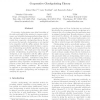Free Online Productivity Tools
i2Speak
i2Symbol
i2OCR
iTex2Img
iWeb2Print
iWeb2Shot
i2Type
iPdf2Split
iPdf2Merge
i2Bopomofo
i2Arabic
i2Style
i2Image
i2PDF
iLatex2Rtf
Sci2ools
115
click to vote
IPPS
2006
IEEE
2006
IEEE
Cooperative checkpointing theory
Cooperative checkpointing uses global knowledge of the state and health of the machine to improve performance and reliability by dynamically deciding when to skip checkpoint requests made by applications. Using results from cooperative checkpointing theory, this paper proves that periodic checkpointing is not expected to be competitive with the offline optimal. By leveraging probabilistic information about the future, cooperative checkpointing gives flexible algorithms that are optimally competitive. The results prove that simulating periodic checkpointing, by performing only every dth checkpoint, is not competitive with the offline optimal in the worst case; a simple modification gives a provably competitive algorithm. Calculations using failure traces from a prototype of IBM’s Blue Gene/L show an application using cooperative checkpointing may make progress 4 times faster than one using periodic checkpointing, under realistic conditions. We contribute an approach to providing la...
Cooperative Checkpointing | Cooperative Checkpointing Theory | Distributed And Parallel Computing | IPPS 2006 | Periodic Checkpointing |
Related Content
| Added | 12 Jun 2010 |
| Updated | 12 Jun 2010 |
| Type | Conference |
| Year | 2006 |
| Where | IPPS |
| Authors | Adam J. Oliner, Larry Rudolph, Ramendra K. Sahoo |
Comments (0)

